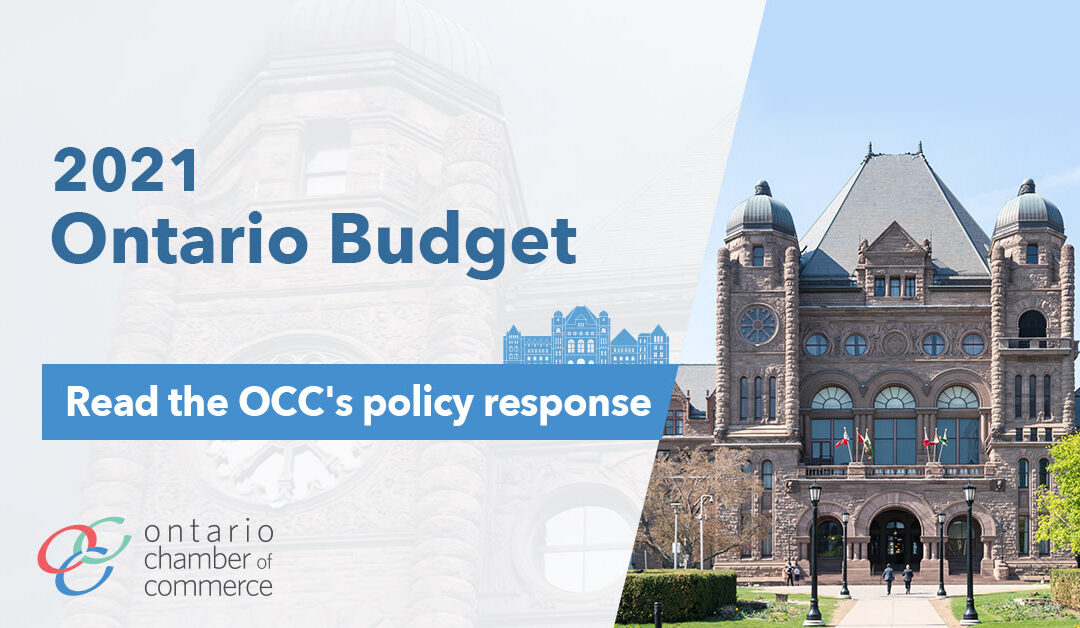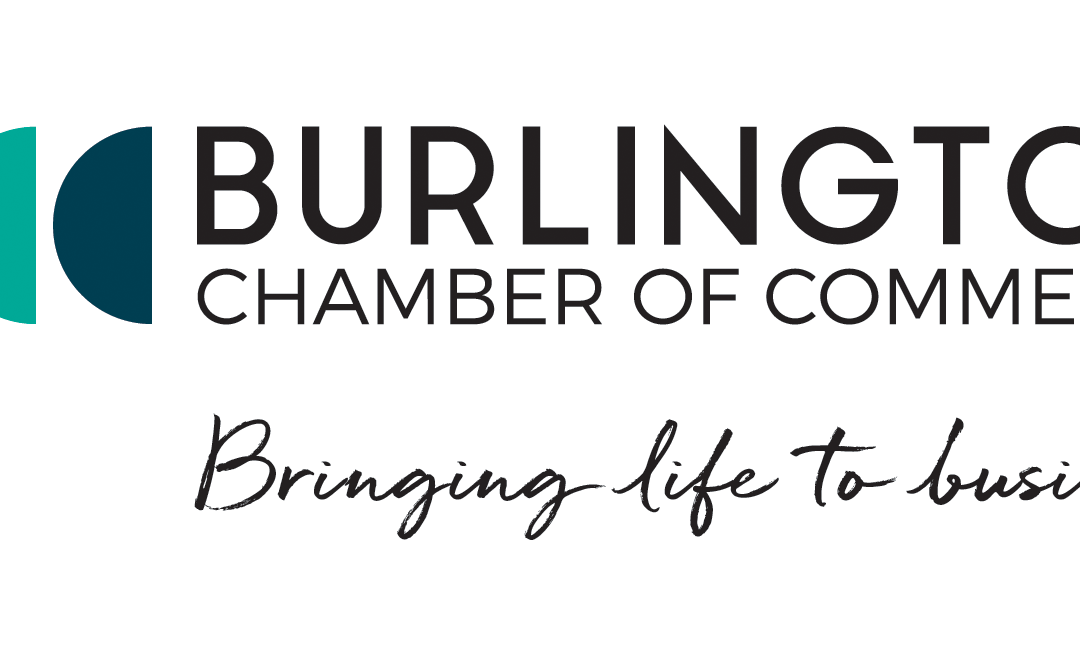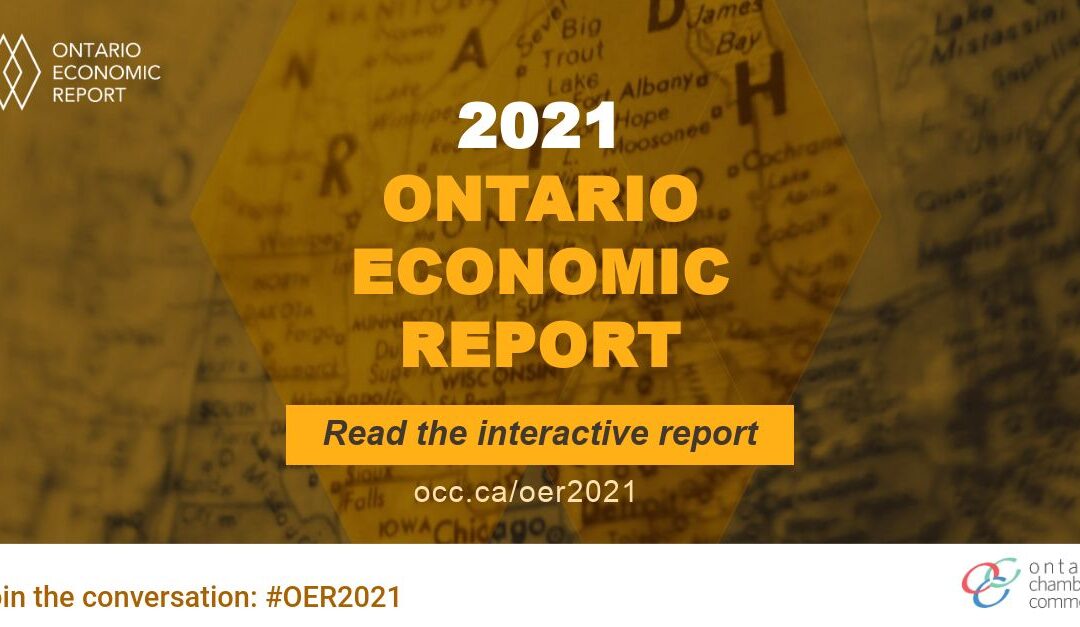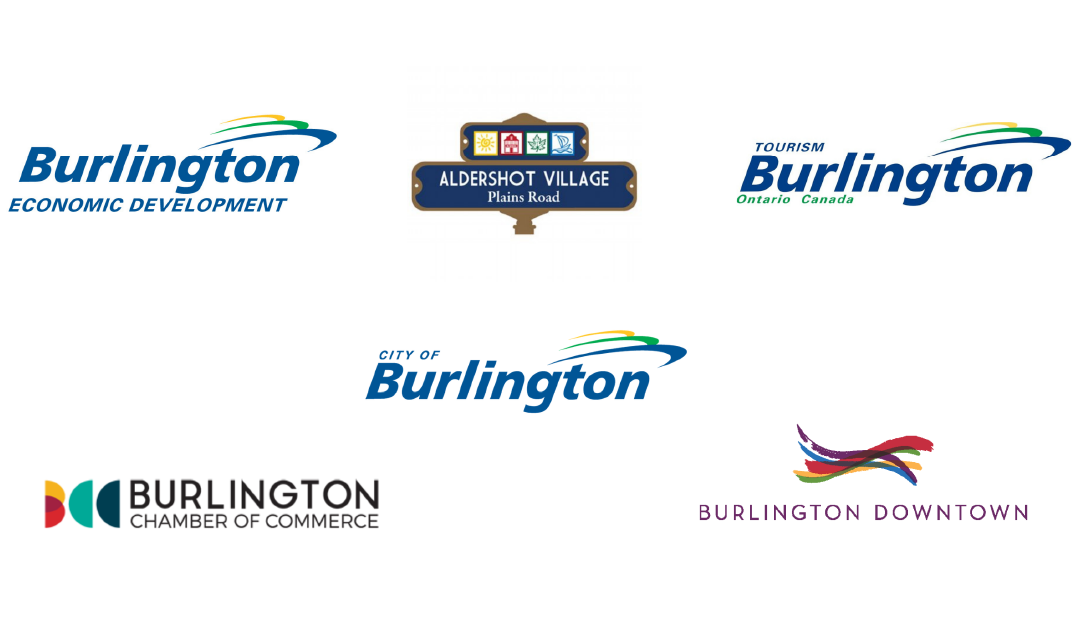
by admin | May 4, 2021 | Chamber News
(May 4, 2021, Burlington, Ontario) Today, the Burlington Chamber of Commerce was presented with the Ontario Chamber of Commerce Outstanding Advocacy Award along with the Sault Ste. Marie Chamber of Commerce for its joint advocacy work on modernizing Ontario’s property tax system. Burlington Chamber President and CEO, Carla Y. Nell and Sault Ste. Marie Chamber CEO, Rory Ring, accepted the award virtually during the Ontario Chamber’s Annual General Meeting and Convention.
“I’m so pleased that we have been recognized for our efforts by our peers at the Ontario Chamber of Commerce for the significant work that was done to drive discussions for change at the provincial and municipal levels of government,” said Nell. “We’ve made some incredible headway in advancing the transformation of Ontario’s tax system, but there is still work to be done, and we are committed to continuing to move this forward as communities across Ontario begin to recover from the pandemic and look for strategies to support their economic prosperity.”
Last year, the Burlington and Sault Ste. Marie Chambers submitted a resolution to the Ontario Chamber of Commerce that was approved unanimously and advanced to the Ontario government for consideration. As a result, the 2020 Ontario budget implemented a number of changes reflected in the resolution including:
- Significant reductions in business education tax rates across the province;
- A moratorium on province-wide reassessment for 2021 with the next revaluation date for all property to be determined in future;
- The creation of a new optional subclass for small commercial properties to allow municipalities to target relief to businesses with a commitment on the part of the Province to match eligible property tax reductions; and
- A commitment to future changes to property valuation methodologies to protect areas undergoing redevelopment and to provide stability and fairness for other complex property types.
At the local level, the Province’s budget announcements led to a series of activities that would see municipalities also offering property tax relief to aid businesses and residents in managing through the immediate hardship brought on by the pandemic, while committing to working towards a modernized property tax system that will better accommodate the needs of municipalities across Ontario into the future.
Many municipalities throughout Ontario have implemented property tax deferral programs enabling businesses to take advantage of at least one financial tool to aid in providing immediate financial relief due to the pandemic.
“I’m incredibly grateful to the Chamber’s Board of Directors and members of our Political Action Committee, as well as Chamber staff who made this award possible. Equally important, I am encouraged by the property tax changes that were implemented and optimistic about the future of modernizing our property tax system in Ontario,” says Nell.
Ontario’s property tax system has not been fully reviewed since the new Ontario Fair Assessment System (OFAS) was first introduced by the former Harris government approximately 25 years ago. Since that time, significant changes have occurred across Ontario’s economic landscape influencing global and local competitiveness and fundamentally altering traditional economic paradigms. This trend has been further compounded by increasing demands placed on municipalities as they are confronted with challenges, such as social housing, the opioid crisis, climate change, rapidly evolving technology, and the growing infrastructure deficit. As the principal source of funding for local government, Ontario’s property tax system requires a significant re-evaluation through the lenses of modernization, ensuring competitiveness, transparency, and stability to ensure fair and equitable property tax treatment for the future.
Media Contact
Corinne Radake
Director, Stakeholder Relations and Policy
corinne@burlingtonchamber.com

by admin | Apr 7, 2021 | Chamber News
No Easy On & Off Switch for Business: Recent Closures Devastating for Business Community
(Toronto – April 7, 2021) – Today, Carla Y. Nell, President and CEO of the Burlington Chamber of Commerce and Rocco Rossi, President and CEO of the Ontario Chamber of Commerce released the following statement in reaction to further restrictions announced today:
“Ultimately, we want to see a safe and sustainable opening of Ontario’s economy. Closures buy us time at a high cost to business, our economy, as well as the mental and the long-term health of Ontarians. We recognize the restrictions brought in today are to help save lives and curtail the spread of the virus. However, in absence of further supports, new restrictions will simply devastate Ontario’s business community.
“An expedited vaccine roll-out prioritizing essential workers who cannot work from home is critical to preventing these stops and starts that are so damaging for business. With the Ontario Business Support Grant coming to a close, we call for continued supports that will see businesses through the third wave of the crisis,” said Carla Y. Nell, President and CEO, Burlington Chamber of Commerce.
“We call on all levels of government to work together to accelerate vaccinating Ontarians, so we can fully reopen the province. As the Government of Ontario proceeds with Phase 2 of the rollout, we would like to see the earlier prioritization of essential workers who cannot work from home and are most vulnerable and at risk.
“The Ontario Chamber’s Ontario Vaccination Support Council members are ready, willing, and able to support and accelerate local vaccine deployment efforts. As supply ramps up, we need an all-hands-on deck approach from Ontario’s business community, labour, associations and academia to move these vaccines from freezers to arms as quickly as possible. From vaccine facilities and centres to volunteers to donations to support ride programs, we truly see Council members stepping up to make a difference.” – Rocco Rossi, President and CEO, Ontario Chamber of Commerce
-30-
Media Contact
Corinne Radake
Director, Stakeholder Relations & Policy
corinne@burlingtonchamber.com

by admin | Mar 25, 2021 | Chamber News
On March 24, 2021, the Government of Ontario released its 2021 Budget, Ontario’s Action Plan: Protecting People’s Health and Our Economy. Budget 2021 contains measures to protect against the immediate impacts of the pandemic on the hardest-hit sectors and communities while laying the groundwork for an inclusive economic recovery, bringing Ontario’s COVID-19 action plan to $51 billion in total support over four years. The following is a summary of highlights from the perspective of Ontario’s business community.
Read the OCC’s response here.
TOURISM
The Province is investing in new programs to support Ontario’s tourism industry: The Tourism and Hospitality Small Business Support Grant ($100 million) will provide one-time payments between $10,000 and $20,000 for small tourism businesses that have experienced a minimum decline in revenue of 20 percent. Examples include hotels, travel agencies, amusement and water parks, and camps. Additionally, the Tourism Recovery Program ($100 million) will help historically successful tourism operators, anchor businesses, and attractions that have helped to drive employment and visitation in their regions by assisting with costs related to restructuring, safe reopening, recalibrated marketing activities, and partnership development.
OCC analysis: Tourism is vital to regional economies across Ontario. Businesses and workers in the sector were among those most impacted by the pandemic. This new funding – combined with the tourism tax credit announced in the 2020 Budget – will support organizations that have not been eligible for other supports and help facilitate the industry’s revival post-pandemic.
SMALL BUSINESS
Budget 2021 builds on many of the programs announced in 2020. The Province is doubling its investment in the Ontario Small Business Support Grant, for a total investment of $3.4 billion to support approximately 120,000 small businesses. Eligible businesses will receive an automatic top-up for this second round. Additionally, Ontario is investing another $10 million towards its Digital Main Street program.
OCC analysis: Small businesses are facing unprecedented cash flow challenges, forcing many to close and others to restructure. The OCC is pleased to see an expansion of successful grant programs. These measures will help thousands of small employers confront the health crisis and keep their workers employed. Using an automatic top-up will provide immediate relief and minimize the administrative burden on both businesses and government.
HEALTH CARE AND MENTAL HEALTH
Budget 2021 commits an additional $1.8 billion to the hospital sector in 2021-2022, as well as an additional $175 million in 2021-2022 to support mental health and addiction services.
OCC analysis: The OCC welcomes these significant investments to support Ontarians and patients. As discussed in the OCC’s report, Realizing the Full Potential of Virtual Care, the pandemic coupled with the public health measures that were put in place to prevent the spread of the virus (e.g., physical distancing), significantly impacted mental health, prompting advocates to warn of a potential “echo pandemic” of mental health problems in the future. This summer, the OCC will release a Mental Wellness in the Workplace Toolkit, which will include recent data and resources Ontario businesses and employers can use to support mental wellness in their workplaces.
BEVERAGE ALCOHOL INDUSTRY
In Budget 2021, the province will extend funding to 2022-2023 for several critical programs, specifically the VQA Wine Support Program (an additional $7.5 million) and the Small Cidery and Small Distillery Support Program (for a total of $2.6 million).
OCC analysis: Ontario’s beverage alcohol industry has been acutely impacted by COVID-19. Specifically, many local wineries and cideries across the province depend on local, international, and agri-food tourism. These local producers help support regional economies, adjacent sectors, and local jobs. While these supports are much welcome, the OCC encourages the Province to consider other recommendations outlined in our report, Refreshing the Sale of Beverage Alcohol in Ontario.
AGRI-FOOD SECTOR
Budget 2021 commits $10 million in 2021-2022 for a one-year expansion to the Enhanced Agri-Food Workplace Protection Program, which aims to help farm businesses implement occupational health and safety measures to prevent and control the spread of COVID-19.
OCC analysis: The OCC welcomes the expansion of this program to help farm businesses with increased costs associated with the introduction of critical safety measures during the pandemic. On April 12, the OCC will be releasing a policy brief entitled Growing a More Resilient Food Supply Chain in Ontario. The brief examines the impact COVID-19 has had on Ontario’s food supply chain, specifically farmers and local producers, and steps the province can take to ensure the agri-food sector is better positioned to handle future disruptions.
WOMEN
The Minister of Finance and the Associate Minister of Children and Women’s Issues will establish a task force on inclusive economic growth to inform recovery efforts. To support parents, the government is proposing a 20 percent top-up of the CARE tax credit for 2021, which would increase the average amount from $1,250 to $1,500 per family, at a cost of approximately $75 million. Ontario is also providing a third round of payments through the Ontario COVID‐19 Child Benefit, doubling payments to $400 per child for this round and $500 for each child with special needs. Finally, the Budget invests an additional $2.1 million over three years to assist survivors of domestic violence and other heinous crimes like human trafficking.
OCC analysis: The OCC appreciates these new measures, as women have been disproportionately impacted by the pandemic. Investing in child care, advancing inclusive economic growth, and fighting gender-based violence are important steps to women’s economic empowerment. Budget 2021 delivers many of the measures we called for in our recent report, The She-Covery Project: Confronting the Gendered Economic Impacts of COVID-19 in Ontario.
COMMUNITIES
Ontario is investing an additional $2.8 billion to expand broadband access, bringing the Province’s total investment to nearly $4 billion over six years beginning in 2019–20. An additional $61 million is being allocated to the Regional Opportunities Tax Credit and another $50 million to the Northern Ontario Heritage Fund Corporation. Further, the government is further extending the pause on property tax reassessments for municipalities.
OCC analysis: The OCC is encouraged by the new measures to support local communities in Budget 2021, particularly as the pandemic has widened regional disparities. The need for reliable broadband access has only become more essential to the well-being and competitiveness of communities. Additional resources towards the Regional Opportunities Tax Credit and Northern Ontario Heritage Fund Corporation will enable rural and northern communities to invest in projects that create local jobs and economic growth. Pausing the property tax reassessment gives municipalities and businesses more capacity and time to adjust to the economic uncertainty and challenges caused by the pandemic.
WORKFORCE DEVELOPMENT
Budget 2021 proposes a new temporary Ontario Jobs Training Tax Credit which would provide support for 50 percent of eligible expenses (up to $2,000) in 2021 for a total projected cost of $260 million over two years. Similar to the Canada Training Credit, eligible expenses include fees for occupational skills courses, trade or professional exams, and postsecondary education courses.
OCC analysis: Amidst rapidly shifting labour market conditions, the OCC has underscored the importance of demand-driven skills programs that help Ontarians get the skills and training they need. Reskilling will be essential to the rapid re-employment of workers that have been displaced throughout the COVID-19 crisis. The government’s proposed tax credit is estimated to help approximately 230,000 Ontarians adapt to a quickly changing labour market.
OTHER SUPPORTS
Budget 2021 contains several other measures to help lay the foundation for a strong economic recovery. The Province is supporting the Invest Ontario Fund ($400 million over four years) to encourage business spending in the key sectors of advanced manufacturing, technology, and life sciences. Ontario is also investing $56.4 million over the next four years to create the Ontario Vehicle Innovation Network (OVIN). OVIN will build on successful elements of the Autonomous Vehicle Innovation Network (AVIN) to accelerate the development of next-generation electric, connected, and autonomous vehicle and mobility technologies. Finally, the government is expanding the Ontario Together Fund with an additional $50 million in 2021-22 to help manufacturers retool their operations to produce personal protective equipment and develop technology‐driven solutions and services for business to reopen safely.
OCC analysis: Programs that build on Ontario’s competitive advantages in high-growth sectors will help position our economy for long-term growth and job creation. In addition to the OVIN initiative, the OCC encourages the Province to consider the recommendations outlined in our report, Moving Forward Towards a Strategic Approach for Ontario’s Transportation Needs, to ensure Ontario maintains its leadership in AV technology.
FISCAL BALANCE
Given the provincial government’s continued spending on healthcare and grants as a means for surviving the pandemic, Budget 2021 includes a number of time-limited COVID-19 spending amounting to more than $100 billion in new debt and deficits. Overall, the province is projecting to see a slight decline in the deficit from $38.5 billion in 2020-21 to $33.1 billion in 2021-22. This includes a decline in overall spending by around $4 billion relative to last year. Although the deficit is expected to gradually decline in the medium to long term, a surplus is not anticipated until at least 2029-30 under a medium-growth scenario and a return to the pre-pandemic deficit of around $10 billion is not expected until 2027-28.
OCC analysis: Given the record level deficit, it is important for the province to have a debt management plan in place and a path to fiscal balance. The continued challenges of COVID-19 have necessitated significant government spending in order to support businesses and individuals across sectors and regions. While support for those in hardest-hit sectors should remain a priority, policies to improve the cost-efficiency of Ontario’s public sector should be explored. The OCC encourages the government to adopt value-based procurement reforms and alternative service delivery, digitize government, reduce administrative burdens, pursue lost revenue from untaxed economic activity, and adopt a formal policy on asset recycling. These measures will improve value for public spending, encourage innovation, and support small businesses.
LOOKING AHEAD
As outlined above, the 2021 Ontario Budget includes a number of major commitments and funding for the hardest-hit sectors and communities, as well as much needed aid for women who have been deeply impacted by the pandemic. However, given the government has recognized modernization of government services and regulatory innovation as priorities, there are certain measures well within the government’s purview that could help further improve the economic backdrop at little to no cost. These include:
- Being bold on interprovincial trade. Ontario should act swiftly to eliminate major interprovincial barriers to trade and labour mobility. The Government of Ontario should also continue supporting the work of the Regulatory Reconciliation and Cooperation Table established under the Canadian Free Trade Agreement.
- Using regulatory modernization to support economic recovery. Temporary regulatory improvements introduced during the pandemic should be made permanent to support economic growth. For example, legal cannabis retailers have been temporarily allowed to engage in e-commerce and offer delivery and curbside pickup options while under lockdown. The Government of Ontario should support the growth of this emerging sector by making online delivery and curbside pick-up options permanent for privately-owned legal cannabis retailers.
For more details please refer to the Ontario Chamber of Commerce’s pre-budget submission.
Read the Ontario Budget here.

by admin | Mar 9, 2021 | Chamber News
The Burlington Chamber of Commerce (BCC) provides value to its members through active advocacy, connecting leaders and creating opportunity. The Chamber is the voice of business in Burlington and advocates at the local, regional, provincial and federal levels on behalf of 900 companies representing 30,000 employees.
For more than 70 years, the BCC has been the trusted advocate and tireless champion for local businesses. With a long-standing reputation for excellence and leadership, BCC continually generates opportunities to connect people by bringing life to business. Doing so provides a vehicle for success for its members and the future of Burlington’s business community. The Burlington Chamber of Commerce seeks an experienced individual for the position of Manager, Membership Development.
Preferred candidates will have demonstrated experience in developing business solutions, revenue generating strategy, managing client accounts, leading value-added customer experiences and relationship building.
The selected candidate will work with our highly dedicated, professional staff and volunteer base and have a strong business acumen, excellent communication skills and an engaging interpersonal style in order to carry out the strategic objectives of the BCC.
Review the Manager, Membership Development position.
APPLICATION PROCESS:
Expressions of interest including resumes and covering letters will be accepted until March 19, 2021, at 11:59 p.m., and should be sent confidentially to info@burlingtonchamber.com.
Information provided by or about candidates for these positions will be used only for candidate selection. We thank each applicant for taking the time and effort to respond; however only candidates to be interviewed will be contacted.

by admin | Jan 28, 2021 | Chamber News
BACKGROUNDER
For immediate release
January 28, 2021
2021 ONTARIO ECONOMIC REPORT KEY FINDINGS – BACKGROUNDER
(BURLINGTON, JANUARY 26, 2021) – Today, the Burlington Chamber of Commerce and the Ontario Chamber of Commerce (OCC) released the fifth annual Ontario Economic Report (OER), providing the latest data on Ontario’s economy and business confidence, highlighting the unprecedented year that was 2020 and the unpredictability that lies in the year ahead.
Key highlights from the OER include:
- Data provided by the Bank of Montreal indicates that Ontario witnessed a steep decline in real GDP growth (-5.6 percent) in 2020 but is projected to see a moderate rebound of 4.8 percent in 2021, fuelled largely in part by expectations for vaccination rollout and the eventual re-opening of the economy.
- Projections for the coming year suggest moderate GDP and employment growth across most regions, suggesting a near-full recovery after steep drops in 2020.
- In 2020, only 21 percent of survey respondents expressed confidence in Ontario’s economic outlook. Less than half of Ontario businesses (48 percent) are confident in the outlook of their own organisations over the next year.
- Small businesses are more pessimistic about Ontario’s outlook than larger ones. Only 20 percent of small businesses expressed confidence in Ontario’s economy, compared to 27 percent of medium and large businesses.
- Confidence also varied considerably across sectors of the economy, a testament to the uneven nature of the pandemic. The most pessimistic sectors were accommodation and food services (62 percent were not confident in Ontario’s outlook); arts, entertainment, and recreation (55 percent); and retail trade (51 percent).
- Employment growth declined throughout the province in 2020 and is expected to make a steady recovery in the year ahead.
- 47 percent of organizations indicate they let employees go due to COVID-19 (23 percent permanently and 24 temporarily).
- Amid the second wave, 53 percent of businesses surveyed said their organizations shrank between June and November; while only 19 percent grew.
- Sectors most negatively impacted by the crisis included: accommodation and food services; arts, entertainment, and recreation; and retail. Businesses in these sectors were among those most pessimistic about the economic outlook and most likely to have shrunk and let go of staff in 2020.
- In some of these sectors, more than two-thirds of organizations let staff go: labour (83 percent), accommodation and food services (70 percent); arts, entertainment, and recreation (68 percent); and transportation and warehousing (67 percent).
- Fewer than one-third of organizations let staff go in the following sectors: management firms (14 percent); utilities (20 percent); government (25 percent); finance and insurance (25 percent); non-profits (31 percent); and real estate, rental and leasing (33 percent).
- From a regional perspective, businesses were most likely to say they shrank in Hamilton-Niagara Peninsula (70 percent) and Northwest Ontario (68 percent). These are two regions that reported above-average employment losses in 2020. A more detailed analysis of regional employment numbers can be found in Ontario’s Economic Outlook.
- Despite lagging confidence in Ontario’s economic outlook and ongoing regional and sectoral disparities in how businesses have been impacted by the crisis, an encouraging 60 percent of businesses believe their communities have enough economic opportunities for them to thrive.
- Further, 60 percent of businesses reported feeling confident that entrepreneurship would rebound after the pandemic. Entrepreneurship and small business growth will play an essential role in Ontario’s economic recovery.
- Businesses’ priorities for governments during economic recovery included enhancing access to capital, reforming business taxes, encouraging Ontarians to buy local, and investing in broadband infrastructure.
CLICK HERE TO REVIEW THE INTERACTIVE REPORT.
– 30 –
MEDIA CONTACT
Corinne Radake
Director, Stakeholder Relations & Policy
corinne@burlingtonchamber.com

by admin | Jan 26, 2021 | Chamber News
Burlington City Council and Team Burlington calling for renewed and expanded funding to support local businesses during COVID-19
Burlington, Ont. — Jan. 26, 2021 — On January 11, 2021, Burlington City Council unanimously approved a resolution calling for the Provincial and Federal government to make changes to extend and expand funding for the Digital Main Street program to support local business.
The resolution was passed, in partnership with the Burlington Economic Recovery Network (BERN) and Team Burlington, calling on the provincial and federal governments to:
- Renew and expand funding to the Digital Main Street program as soon as possible to help our businesses to survive the provincial lockdown and reopening of the economy in the future;
- Renew the $2,500 Digital Transformation Grant and Digital Service Squad support; and
- Expand the Digital Main Street Transformation Grant to be available to main street businesses that are located outside of BIAs as the initial program restricted applicants to BIA member businesses only
- Commit to a minimum 2-year funding extension to the Digital Main Street program
The resolution was developed in partnership with the Burlington Economic Recovery Network (BERN) and Team Burlington, which includes representatives from Tourism Burlington, Burlington Economic Development, Burlington Chamber of Commerce and two business improvement areas – Aldershot Village BIA and the Burlington Downtown Business Association. Mayor Marianne Meed Ward and Ward 1 Councillor Kelvin Galbraith sit on the BERN.
The BERN chair Randall Smallbone and Mayor Meed Ward have co-signed a letter to the Minister of Economic Development and Official Languages the Honorable Mélanie Joly and the Minister of Economic Development, Job Creation and Trade the Honourable Victor Fedeli. The letter includes a copy of the resolution and reinforces the critical support to local main street businesses during COVID-19.
The Digital Main Street Program has been a critical support to local main street businesses during COVID-19 that Team Burlington has implemented based on business concerns raised by the Burlington Economic Recovery Network. As part of the program, Burlington has benefitted from hiring two Digital Service Squad members who have had over 1,000 touchpoints with businesses and supported over 130 businesses to date in growing their digital presence and tools. In addition, qualifying businesses have been able to access a $2,500 Digital Transformation Grant to implement digital tools within their business.
When the province of Ontario went into lockdown on December 26th, 2020 online and digital channels became the primary method for main street businesses to interact with customers and generate revenues. Many businesses reached out to Burlington’s Digital Service Squad team for support in how to engage with customers, update their website and use social channels to promote curbside pickup and takeaway, in line with provincial lockdown restrictions placed on business. As of December 31th, 2020 applications for both the $2,500 Digital Transformation Grant and new applications for Digital Service Squad support have been closed to new applications awaiting the renewal of funding.
On January 20th, 2021, a similar resolution was brought forward to Halton Regional Council by Mayor Meed Ward and Ward 1 Councillor Kelvin Galbraith and was unanimously endorsed. Multiple members of Burlington City Council are also members of the local business community, with Ward 1 Councillor Kelvin Galbraith and Ward 6 Councillor Angelo Bentivegna both being longtime business owners in Burlington. Councillor Bentivegna also has a long history in the hospitality industry.
The City of Burlington’s fundamental priority throughout the COVID-19 pandemic has been to protect the health and safety of Burlington residents, employers and employees, and support our business community to survive the economic impacts of COVID-19 public health measures.
Burlington is ranked as Canada’s best community and best place to raise a family. It is a City where people, nature and businesses thrive. As residents continue to rediscover many of their favourite spaces and activities in the city, City services may look different as we work to stop the spread of COVID-19. The City’s commitment to providing the community with essential services remains a priority. Sign up to learn more about Burlington at Burlington.ca/Enews and download the free City of Burlington app. For more information about the Burlington Economic Recovery Network, visit https://www.burlingtonchamber.com/bern/.
Quotes
Mayor Marianne Meed Ward
“The Digital Main Street Program is a critical lifeline for many of our businesses. Now more than ever, our businesses need help to go digital to ride out the continued shutdown. Extending this program, and expanding it to businesses outside of BIA areas, will go a long way to help ensure our small businesses will be there for us on the other side of COVID-19.”
Ward 1 Councillor Kelvin Galbraith
“As this pandemic continues into its second year, we need to provide all the assistance that we can to our local business community that are suffering. The extension of the Digital Main Street funding will continue to help businesses outside of BIA areas with opening up additional streams of revenue from online offers.”
Ward 6 Councillor Angelo Bentivegna
“This is a great opportunity for small business here in the City of Burlington. We are thankful to the Burlington Economic Recovery Network (BERN) for their advocacy work on behalf of small business. The expansion of the Digital Main Street program will help local retail and restaurants to look for alternate methods to increase sales and support the needed training and technical advice. Small businesses will be able to introduce new technology into their portfolio that typically they may not be able to create or afford. This program will add needed innovative technology to many local businesses. I am pleased to see the expansion of this program, not only to increase online customer base but also as a potential tool to expand this program after this pandemic. The positive message here, during this pandemic, is that Burlington has supported small business entrepreneurs and will continue to in the future.”
Randall Smallbone, Chair of the Burlington Economic Recovery Network
“I thank the Mayor and our City Council for supporting BERN’s efforts in advocating for the expansion and extension of the Digital Main Street program. We all know the impact of this pandemic will not end anytime soon and will likely carry forward into 2022. Every effort has to be made to keep our small businesses alive, and this program is critical to helping us do that.”
Attachments
BERN resolution to Burlington City Council
BERN letter to province
COVID-19
-30-
Communications contact:
Suzanne Vukosavljevic
Manager of Communications, City of Burlington
Office: 905-335-7600, ext. 7841
suzanne.vukosavljevic@burlington.ca






